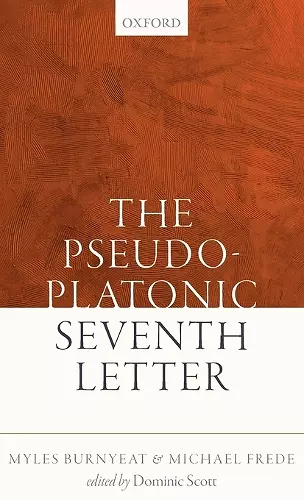The Pseudo-Platonic Seventh Letter
Michael Frede author Myles Burnyeat author Dominic Scott editor
Format:Hardback
Publisher:Oxford University Press
Published:11th Jun '15
Currently unavailable, and unfortunately no date known when it will be back

The Seventh Platonic Letter describes Plato's attempts to turn the ruler of Sicily, Dionysius II, into a philosopher ruler along the lines of the Republic. It explains why Plato turned from politics to philosophy in his youth and how he then tried to apply his ideas to actual politics later on. It also sets out his views about language, writing and philosophy. As such, it represents a potentially crucial source of information about Plato, who tells us almost nothing about himself in his dialogues. But is it genuine? Scholars have debated the issue for centuries, although recent opinion has moved in its favour. The origin of this book was a seminar given in Oxford in 2001 by Myles Burnyeat and Michael Frede, two of the most eminent scholars of ancient philosophy in recent decades. Michael Frede begins by casting doubt on the Letter by looking at it from the general perspective of letter writing in antiquity, when it was quite normal to fabricate letters by famous figures from the past. Both then attack the authenticity of the letter head-on by showing how its philosophical content conflicts with what we find in the Platonic dialogues. They also reflect on the question of why the Letter was written, whether as an attempt to exculpate Plato from the charge of meddling in politics (Frede), or as an attempt to portray, through literary means, the ways in which human weakness and emotions can lead to disasters in political life (Burnyeat).
The Pseudo-Platonic Seventh Letter, wonderfully edited by Dominic Scott, contains strong arguments that involve ancient epistolography, Sicilian and Southern Italian history, and Platos philosophy and political view. * Catalin Partenie, Polis *
... we must be grateful to Burnyeat for this line-by-line commentary, which provides a major aid for all readers of this difficult text... * Charles H. Kahn, Notre Dame Philosophical Reviews Online *
ISBN: 9780198733652
Dimensions: 222mm x 147mm x 20mm
Weight: 414g
242 pages